IMS Culture_The Key Pillars of…
Page Info
Writer 지중해지역원 Hit 115,578 Hits Date 24-07-08 13:18Content
The Key Pillars of Algeria's Cultural Identity
M. H. Mozafari
Algeria, with its ancient history and rich culture, is one of the most significant centers of civilization in the Arab and Islamic world. Religion and language are two key factors that play an important role in shaping and strengthening the cultural identity of its people. In the preamble of the Algerian Constitution, it is stated:
“The 1st November 1954 was a turning point in determining her future and a tremendous crowning of a ferocious resistance during which she withstood the diverse onslaughts on her culture and values, as well as the fundamental constituents of her identity, namely Islam, Arabism and Amazighism that the State has been relentlessly endeavouring to promote and develop each one of them; the roots of her current exertion in the various domains stretch back to the glorious past of her Nation.” In another paragraph it introduces the Algeria as a “land of Islam, an integral part of the Great Arab Maghreb and an Arab, Mediterranean and African country” In another paragraph, while emphasizing ideological, nationalistic, and geographical identities, Algeria is introduced as “land of Islam, an integral part of the Great Arab Maghreb and an Arab, Mediterranean and African country.” Articles 2 to 5 of the constitution once again designate Islam as the official religion, Arabic as the official language, and Amazigh as the national language. (Algerian Constitution, 2024)
Over 99% of 45,606,480 Algeria's population are Sunni Muslims (World Bank, 2024). Islam plays a vital role in daily life, culture, and the laws of the nation. Small religious minorities, including Christians and Jews, also reside in Algeria. Arabic is used in education, government correspondence, and the media. However, the Berber (Amazigh) language, with its various dialects, is also recognized as a national language. Amazigh is the mother language of about 27% of the population. In addition to Arabic and Amazigh, French is widely spoken due to the history of French colonization and is used as a second language in education and commerce. French serves as a powerful tool for conveying shared culture, history, and values.
Algeria's dynamic and rich culture is a blend of cultural elements and historical, geographical, and social influences that together form the diverse cultural characteristics and identity of Algeria. The history of Algeria has been influenced by the Phoenician, Roman, Arab, Ottoman, and French civilizations, each leaving its mark on Algerian culture and society. Algeria's cultural heritage includes historical sites, museums, and ancient artifacts. This brief article cannot cover all aspects of Algeria's culture and civilization. Therefore, it will focus on the two main pillars that constitute Algeria's cultural identity.
I. Religion
The series of Islamic conquests in the 7th century reached North Africa, and Islam was introduced to these regions by Arab conquerors. The Berber (Amazigh) tribes, the original inhabitants of these areas, gradually accepted Islam and, with their efforts, established Islamic governments in North Africa, including Algeria, and in Andalusia. These governments, with the help of scholars and Sufis, played a significant role in promoting and strengthening Islam in the region, including in Algeria. Scholars established schools, libraries, and religious institutions, while Sufis created monasteries and Sufi orders to spread Islamic teachings and attract people to Islam.
Islamic schools and educational centers played an important role in educating and training new generations. These centers not only taught religious sciences but also various other disciplines, thereby spreading Islamic culture and civilization. Gradually, Islam became the most important pillar of the cultural and civilizational identity of this country. Local governments (13th to 16th centuries), such as the Almoravid and Almohad dynasties, also helped in spreading and strengthening Islam in Algerian society. These periods played an essential role in deepening the Islamic identity of the Algerian people.
Today, majority of Algerians are Sunni Muslims. Islam is the official religion of the country, and religion plays a very significant role in the daily life and culture of the people. The unifying role of Islam, the establishment of Islamic governments, the activities of scholars and Sufis, and the influences of Islamic educational and social systems have all contributed to the spread and deepening of Islam in Algeria. Today, Islam is considered an inseparable part of the national and cultural identity of the Algerians.
During French colonization, Islam acted as a symbol of cultural and identity resistance against the French colonizers. Algerian independence fighters used Islamic teachings to strengthen their national identity and cultural resistance. After Algeria's independence in 1962, the new government continued to emphasize Islam as one of the main pillars of the country's national and cultural identity, further promoting and strengthening it in society.
Although Islam served as a unifying and identity-building factor during the struggle against French colonization and united the people, at some historical moments, internal religious and political differences led to divergence. Throughout history, different Islamic groups have clashed over various interpretations of Islam and governance issues. This shows that depending on the political and social context, different interpretations of Islam can sometimes act as a unifying factor and other times as a source of division. Interpretations of the primary texts of Islam among the Algerian people are subject to specific interpretative schools, which have been influenced by the country's historical and cultural developments at different times. Here, we briefly outline the most important interpretative characteristics of Islam among majority of Algerians and some groups:
1. Jurisprudential Characteristics:
Most Algerian Muslims follow the Maliki school of jurisprudence in Islamic law and regulations, one of the four main Sunni jurisprudential schools. Historically, the governments and jurists of Andalusia and Northwest Africa have adhered to Maliki jurisprudence. This approach could indicate a desire to preserve local identity and reduce Abbasid influence. The Abbasid Caliphate in Baghdad followed the Shafi'i school. Maliki scholars and missionaries played a significant role in promoting this school in North Africa. They helped spread Maliki jurisprudence among the people by establishing schools and educational centers and promoting its teachings.
2. Sufi Characteristics:
Sufism in Algeria is deeply rooted. Before the emergence of the Almohad state in Andalusia and North Africa, rulers and Maliki jurists fiercely opposed the philosophical and Sufi ideas widespread in the eastern Islamic world. At various historical points, under the orders of Maliki jurists and judges, the books of Sufis, such as those by Imam Muhammad Ghazali, were burned, and promoters of such ideas were punished. However, gradually, Sufi ideas, especially those of Imam Muhammad Ghazali, gained many followers among the people. Today, various Sufi orders, including Qadiriyya and Tijaniyya, are active and influential in Algeria and North African countries. Nonetheless, adherence to Maliki jurisprudence remains a cultural and identity feature of the people of Algeria and the countries of the Northwestern Mediterranean.
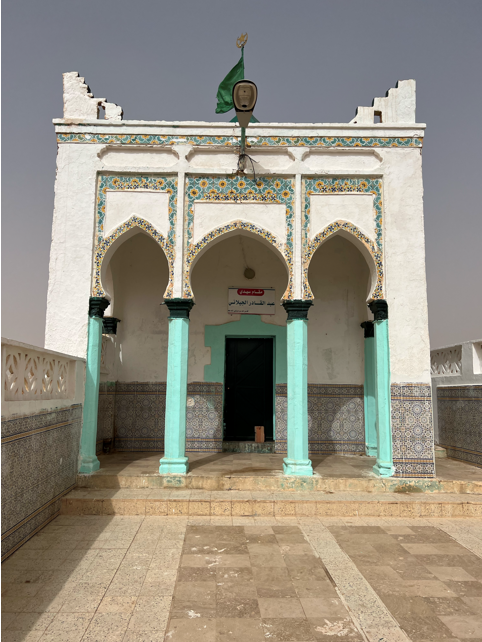
<Maqam Abd al-Qader Jilani in Laghwat>
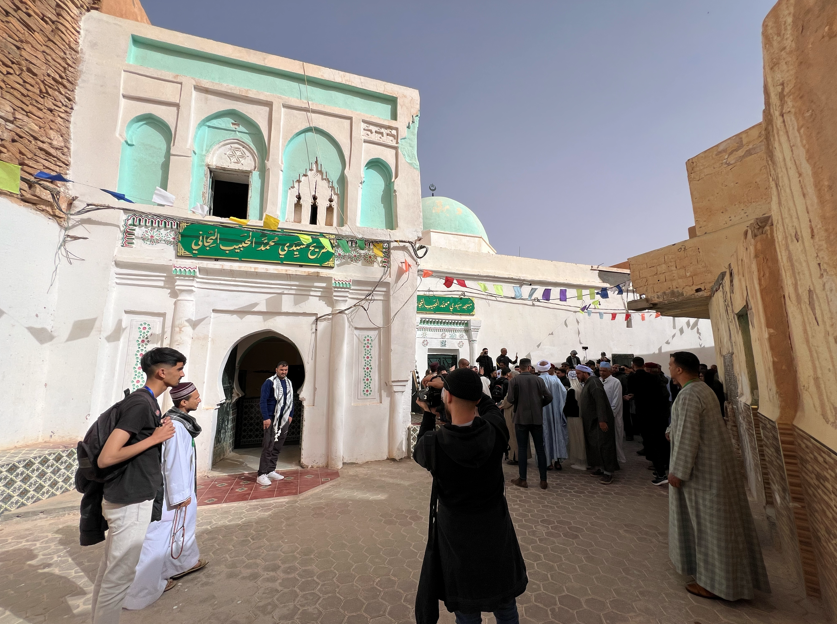
<Tomb and Mosque of Sidi Mohammad al-Tijani in Ain Madhi>
3. Theological and Philosophical Characteristics:
As mentioned, Maliki jurists were highly sensitive to the philosophical ideas spread in the eastern Islamic world and strongly opposed their propagation, punishing promoters of such ideas. Despite such opposition, several renowned Muslim scholars and thinkers, such as Ibn Tufail and Ibn Rushd, emerged in the western Mediterranean and Andalusia with deep philosophical inclinations. During the Andalusian period, there were intense intellectual, political, and social competitions between Maliki jurists, supporters of Sufi ideas, and proponents of philosophy. The peak of these jurisprudential, Sufi, and philosophical competitions can be seen in the works of Ibn Rushd. Despite the philosophical efforts of Ibn Rushd, a famous Islamic philosopher, the intellectual competition in Andalusia and North Africa, including Algeria, saw jurisprudential and Sufi currents victory over the proponents of philosophy. From then on, Muslims in the western Mediterranean and Algeria were influenced by the Maliki school and Sufi ideas.
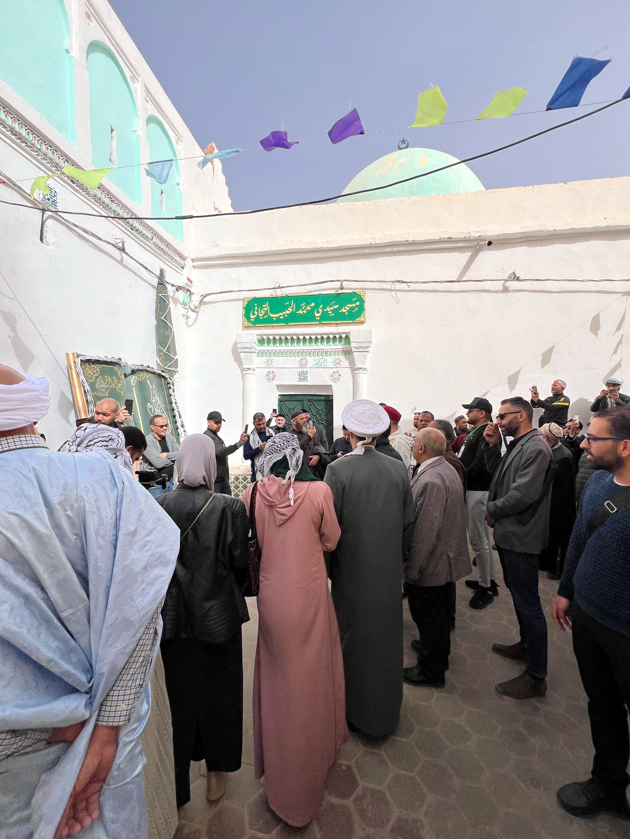
<A Group of Sufis chanting at the Entrance of the Tomb and Mosque-
of Sidi Mohammad al-Tijani in Ain Madhi>
4. Political Characteristics:
Islam in Algeria has played and continues to play an important and active role in responding to internal and external political issues in the Islamic world. This feature is well observed during the struggle against colonization and after independence.
In recent decades, parts of the Algerian population have used peaceful methods to bring about political, social, and cultural changes, while some have been influenced by various political and militant groups, resorting to violence to enact changes in the political system of the country. Some militant groups, influenced by Salafi-jihadist ideologies, have inclined towards transnational armed groups.
During the bloody clashes between the Algerian government and opponents (1990s), the military suppressed the armed groups, while the government engaged in dialogue and negotiation with the most influential opposition leaders, establishing relative security and calm in the country. Although the influence of armed groups in society has decreased in recent years, Algerian society still faces threats in this regard. The features mentioned above show the diversity, cultural and religious depth, and dynamism of Algerian society.
Algerian Languages
I. Algerian Languages
In Algeria, several languages are widespread, each playing an important role in the country's daily life, culture, and official matters. Arabic and Amazigh (Berber) are the official and national languages and form essential pillars of Algeria's cultural identity. In addition to these two languages, French is also significantly used due to the prolonged French colonization, particularly in commerce, administration, and education. Algerian literature is written in both Arabic and French. Although English has a limited role compared to Arabic, Amazigh, and French, it is expanding due to its importance in higher education and international communication, and it is taught as a foreign language in schools and universities. The combination of these languages reflects Algeria's cultural and historical diversity, with each playing a significant role in the daily and official activities of its people. This section discusses the importance of the three languages that shape Algeria's cultural identity:
1. Arabic Language and Historical Development of Algeria
The mother tongue of Algerians is Arabic. This local dialect of Arabic, influenced by Berber, French, and Turkish, is primarily used in daily communication and conversation. Modern Standard Arabic is the official language of the government, media, and education in schools and universities. Standard and official Arabic is also used in other Arab countries. The Arabic language in Algeria has a long history intertwined with the region's historical and cultural developments. The spread of Arabic in Algeria includes several significant historical phases:
a) Arabic Language in the Era of Islamic Governments
In the mid-7th century, Muslims conquests reached North Africa, bringing Islam and the Arabic language to the region, including Algeria. The establishment and expansion of Islamic schools and scientific centers played an important role in the spread and proliferation of the Arabic language in various parts of the Islamic world, including Algeria. Arab conquerors and governments introduced Arabic as the language of Islam and governance. Arabic gradually took its place alongside the native Berber (Amazigh) languages and, over time, especially in urban areas and educational centers, became more dominant. During the Medieval Ages, Arabic was established as the official language of the government, science, and Islamic religion.
b) Arabic Language in the French Colonial Period (1830-1962)
In 1830, Algeria came under French colonial rule, and French was introduced as the official language of the colonial government. Although the use of Arabic in official matters and education was restricted during this period, Arabic maintained its place as the language of religion and culture among the people and played an significant role in shaping the national identity of the Algerian people.
c) Arabic Language in the Post-Independence Period
After Algeria gained independence in 1962, the Algerian government implemented Arabization policies aimed at strengthening the country's cultural and national identity. Arabic was officially introduced in the Algerian constitution as the country's official language. The first Algerian constitution, adopted in 1963, declared Arabic as the official language of the country. As the language of the Quran, Islam, and Islamic culture, Arabic gradually replaced French in the administrative system, education, media, and daily life of the people.
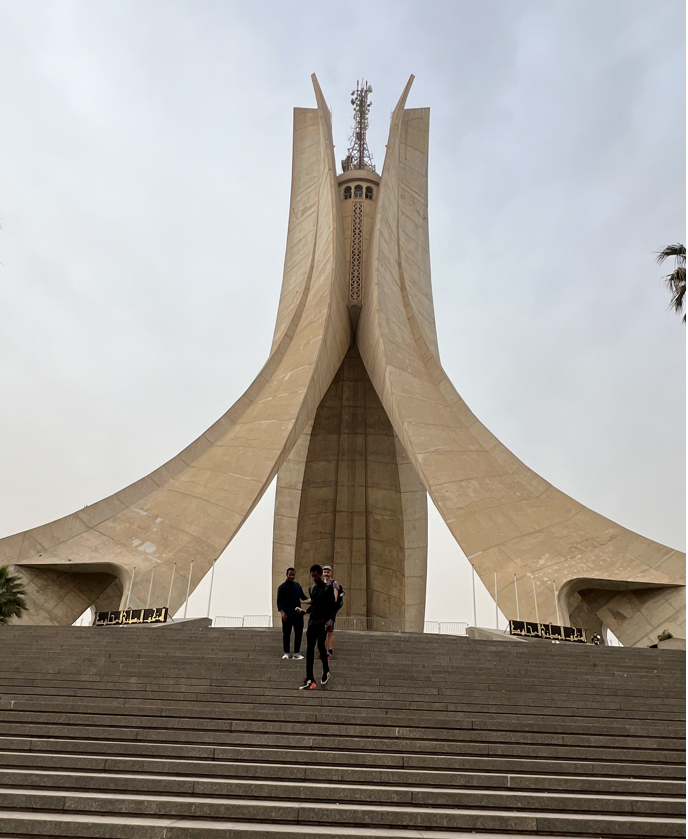
<Martyers’ Memorial Tower, Algiers, Reminder of the lives lost during war for independence>
2. Amazigh Language
The Amazigh language, with its unique alphabet and script, is one of the indigenous languages and a cultural and historical heritage of North Africa. Many people in different regions of North Africa, including Algeria, Morocco, Libya, Tunisia, Mali, and Niger, speak this language with various dialects. The Amazigh language plays an important role in the cultural identity of the Amazigh population. It holds a special place in Algerian culture through its presence in oral and written literature, music, poetry, and performing arts. Amazigh poems and stories have been passed down orally from generation to generation.
The colonial policies during France's rule over Algeria aimed at erasing the country's identity elements, especially those of Arab and Amazigh culture, faced popular resistance. The Amazigh people's efforts to preserve their cultural heritage and secure their linguistic and cultural rights represented another face of the Algerian nation's political, social, and cultural struggles against colonialism.
After Algeria's independence in 1962, the new government pursued Arabization policies to strengthen national identity and cohesion. This move led to dissatisfaction and reactions from the Amazigh people. In the 1980s, the Amazigh cultural movement, known as the "Berber Spring," reached its peak. The Berber Spring began with widespread protests at Tizi Ouzou University and spread to other Amazigh-populated areas, drawing attention to the Amazigh people's rights.
In 2001, another series of large-scale protests occurred in the Kabylie region, known as the "Black Spring." This movement began following the killing of an Amazigh youth by security forces, leading to violent clashes between protesters and government forces. This movement put further pressure on the government to recognize Amazigh linguistic and cultural rights.
The struggles of the Amazigh people for the constitutional recognition of the Amazigh language eventually bore fruit. In 2016, with the approval of a constitutional amendment, the Amazigh language was recognized as the second official language of the country alongside Arabic. According to Article 4 of the Algerian Constitution, "The national and official languages of Algeria are Arabic and Amazigh. The state is committed to promoting and developing the Amazigh language as a cultural and linguistic heritage of the country." This article demonstrates the Algerian government's commitment to preserving and promoting the Amazigh language and culture (Algerian Constitution, 2024).
Since then, the Amazigh language has been included in the educational system and media. Teaching the Amazigh language in schools and broadcasting television and radio programs in this language reflect the government's efforts to preserve and promote it.
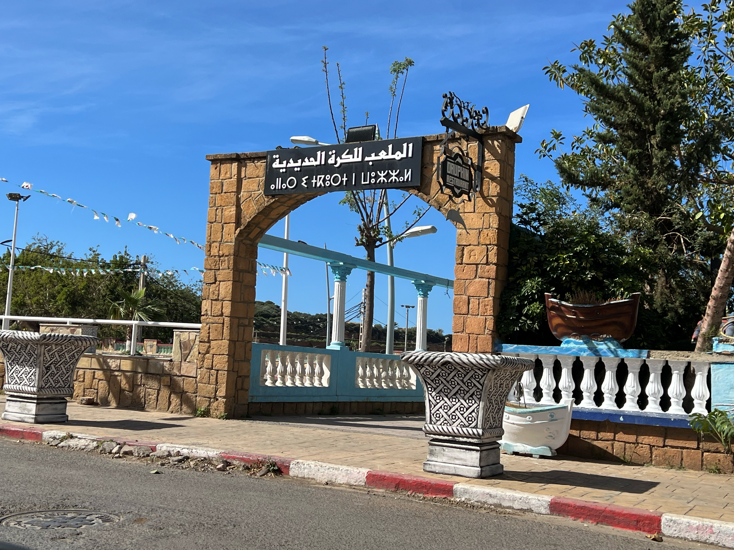
<A Stadium Entrance, Written in Arabic and Amazigh Language>
List of comments
No comments
